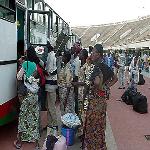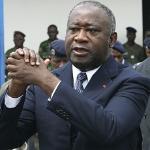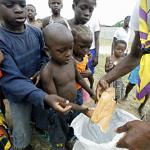April 18, 2011

Photo: AP
Part of millions of frightened immigrants, some Burkina Faso citizens unload their belongings at the national soccer stadium in Ouagadougou, Burkina Faso after they came home from the cocoa plantations and coffee fields of neighboring Ivory Coast (File Photo)
The new government of Ivory Coast comes to power in a country divided by years of often-violent debate about what it means to be Ivorian.
Founding father Felix Houphouet-Boigny offered work to thousands of West African immigrants as part of his drive to make Ivory Coast the world's largest cocoa producer.
Start of "Ivorianess"
But when cocoa prices dropped and Houphouet-Boigny died in 1993, his successor, Henri Konan Bedie, sought to capitalize on voter anxiety about a falling economy by speaking out against people whose parents were not born in the country before independence. Those "non-native" Ivorians were blocked from voting in 1995 and were increasingly subject to attacks, especially in the south.
While Bedie popularized the issue of "Ivorite" or "Ivorianess," it was former president Laurent Gbagbo who pushed the depths of its xenophobia. Former prime minister Alassane Ouattara was repeatedly blocked from running for president because of questions about his parents being born in what is now Burkina Faso.
Having won the right to contest the office as part of a peace plan that followed a brief civil war, Ouattara's candidacy was repeatedly attacked by Gbagbo. In their November run-off election, Gbagbo told voters that there was only one "real" Ivorian in the race, warning that they should never trust the leadership of their country to a foreigner.
Politics and nationalism
Ouattara won that vote, but Gbagbo refused to give up power and held out with the backing of the army until he was finally captured in an underground bunker last week. Ouattara now comes to office hoping to end the divisions of "Ivorite."

Reuters
Ivory Coast's former President Laurent Gbagbo (File Photo)
President Ouattara says Ivorians will come out of this crisis stronger, because they will get down to work with a shared sense of brotherhood and solidarity. No matter how painful these trials have been, the president says, Ivorians must say, "Never again." He says Ivorians must now have a lasting peace that strengthens the country's motto of hospitality and brotherliness.
Mohammed Dikite says the end of the Gbagbo era ends the question of "Ivorite."
Dikite says Ivory Coast is one indivisible country, north and south, east and west, and center - everyone is equal. There are now not Ivorians from the north and Ivorians from the south. "We are all equal," Dikite says, with a hope to return to the prosperity of Houphouet-Boigny.
Unification
Abidjan Catholic Parish Council President Deblaise Honorat Kouao says the country must unite.
Kouao says the people of Ivory Coast have been pressured and pushed and had to hide to stay alive, so they hope peace has now arrived with God's blessing. He says Christians, who are mainly from the south, and Muslims, who are mainly from the north, are working together during this time to seek a peace that they believe will come.

Reuters
A man distributes bread to children at Abidjan's St. Ambrose church, a temporary refuge for people who fled from clashes between forces loyal to incumbent president Laurent Gbagbo and his rival Alassane Ouattara (File Photo)
The United Nations says more than 1,000 people have been killed during the political crisis that followed November's vote. Added to the deaths from the country's brief civil war and nearly 10 years of instability, the total is still far below what neighbors Liberia and Sierra Leone experienced during their recent upheaval.
Future of "Ivorianess"
U.N. Special Representative to Ivory Coast Young-jin Choi says that is a good sign for a future free of the divisions of "Ivorite."
"Ivorians have a culture of not killing each other, that is one of the reasons why Gbagbo brought in the mercenaries from Liberia and other countries to do the dirty jobs," said Young-jin Cho. "That explains also the low probability of a recurrence of civil war."
For the moment, Gbagbo and his party are calling on Ivorians to stop the fighting and move on from this political crisis. Resolving the issue of "Ivorite" in the military means reconstituting Gbagbo's southern-dominated army to include members of the northern-based rebellion that helped bring Ouattara to power.
There is also the issue of justice for human-rights abuses, which President Ouattara says will be handled by an impartial truth and reconciliation commission empowered to question the guilt of any Ivorian, regardless of their heritage.